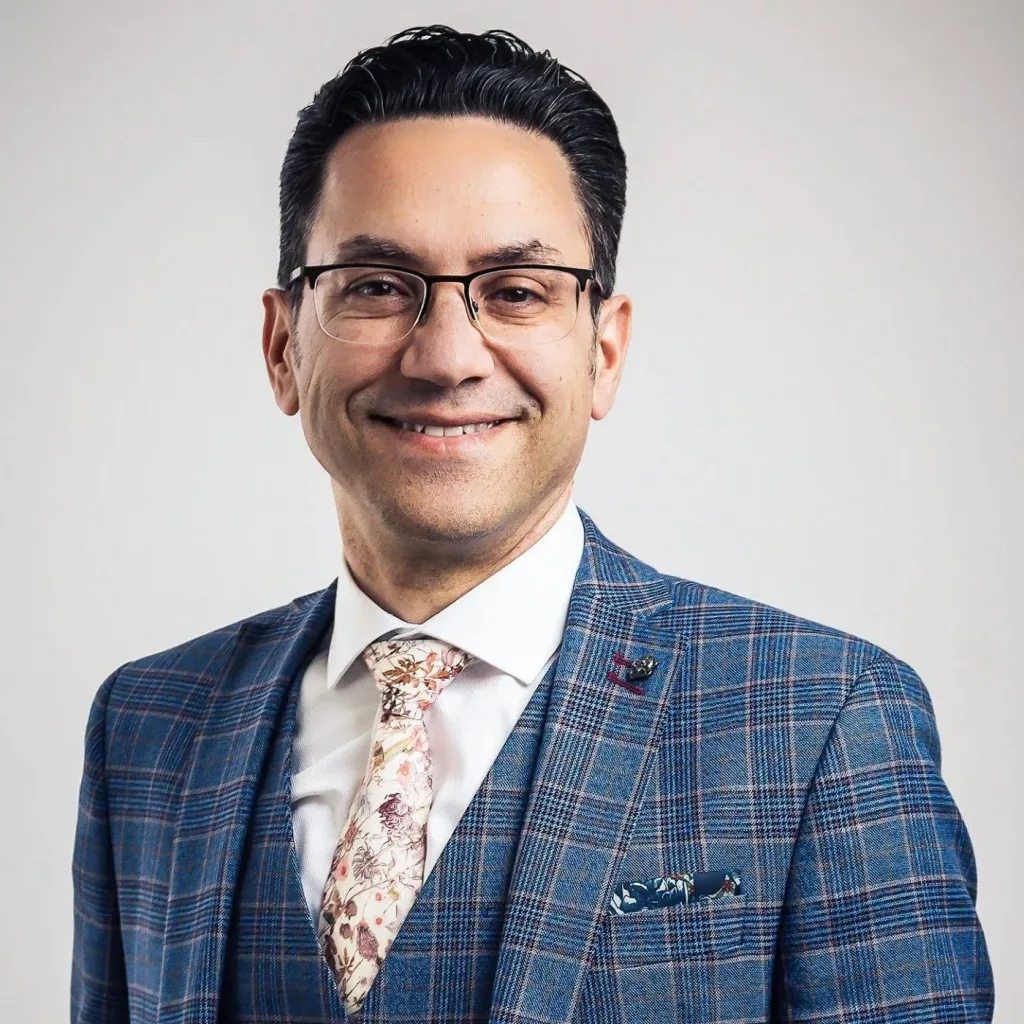Choosing a plastic surgeon is a very personal decision, and there are many important factors to take into consideration. Training, specialisation of the surgeon, and the quality of the reviews given by previous patients are some of the most common factors to take into account.
This article serves as a six-part guide to making your final decision on how to choose a plastic surgeon, exploring the most important things to research and helping you understand the type of surgeon best suited to your needs.
1. Identify Your Surgeon’s Credentials
It is always advisable to have a clear picture of the surgeon’s cosmetic surgery credentials before deciding to entrust them with your procedure. A good place to start is by checking through their certifications to make sure they match with the industry standard or exceed it.
The CREO Clinic’s head surgeon, Dr. Omar Tillo, is a Fellow of the Royal College of Surgeons (FRCS) in Plastic Surgery as well as a member of the British Association of Aesthetic Plastic Surgeons (BAAPS) and the European Board of Plastic Reconstructive and Aesthetic Surgery (EBOPRAS). He is also on the United Kingdom General Medical Council (GMC) Specialty Register For Plastic and Reconstructive Surgery.
What Certifications Do They Hold?
There are some key certifications for UK cosmetic surgeons that are a minimum to help you guarantee a trustworthy surgeon who can safely provide high-quality outcomes.
General Medical Council (GMC)
In the UK, for a plastic surgeon to be worth considering, they should be registered with the General Medical Council (GMC) Specialty Register for Plastic and Reconstructive Surgery.
The GMC was founded as a way to keep a register of members who are adequately trained and qualified to practise medicine in their field. It helps to establish professional and ethical standards that medical practitioners must follow or risk the possibility of being ‘struck off’ – meaning they can no longer do medical work in the UK.
It is possible in the UK to work without being registered on the specialty register for plastic and reconstructive surgery – this would mean they have completed their training outside of the UK or that they are not a plastic surgeon.
To check that your surgeon has been trained under the strict quality regulations of the UK, search for their name on the register. Our surgeon, Dr. Omar Tillo, can be found on the register here.
Royal College of Surgeons (RCS)
Having an accreditation from the Royal College of Surgeons (RCS) is a way of demonstrating a surgeon’s commitment to staying at the forefront of their field – keeping track of the newest, safest, and most effective techniques used by surgeons. The RCS has over 25,000 members around the world who wish to demonstrate how strongly they value patient-centred care.
Cosmetic surgeons who have received the fellowship of the Royal Colleges of Surgeons (FRCS) accreditation can give you greater confidence in their skill, attitude to patient safety, and the quality of their cosmetic outcomes in general.
British Association of Aesthetic Plastic Surgeons (BAAPS)
Another indication of a high-quality, reputable surgeon is membership of the British Association of Aesthetic Plastic Surgeons (BAAPS). BAAPS is to provide information to the general public to help them make the best decisions regarding plastic surgery. Surgeons registered with BAAPS press must be on the Specialist Register of Plastic Surgery of the GMC, and the organisation provides medical practitioners with regular updates on cutting-edge research and professional development.
Dr. Tillo is an active member of BAAPS, recently publishing the UK guidelines for superficial gluteal lipofilling (SGL), having pioneered safer techniques for use in the treatment. These guidelines are followed by all UK cosmetic surgeons who are members of BAAPS.
2. Confirm Their Experience & Training
For your safety and peace of mind, it’s important to get a clear picture of your potential surgeon’s experience, both in general and, more specifically, in your particular procedure. You should ask how many times they have performed your procedure, how many reviews they’ve received for that procedure, and ask to speak to a previous patient – someone they have treated who had similar cosmetic needs to your own.
What Kind Of Plastic Surgery Do They Specialise In?
When choosing a plastic surgeon, you should keep your particular procedure in mind – does your surgeon specialise in the type of treatment you need? Do they have training and experience in that surgery? If the answer is ‘yes,’ then they are more likely to provide the fine-tuned, high-quality outcomes you desire.
Body contour surgeons often specialise in different areas of the body for particular techniques. For example, they may specialise in non-surgical cosmetic procedures, surgeries of the face, or surgeries that contour the body – check the reviews left by previous patients regarding the procedure you are interested in and make sure they are pleased with the outcomes provided by the cosmetic surgeon.
Cosmetic Surgery vs. Reconstructive Surgery
The term ‘plastic surgery’ covers both cosmetic and reconstructive surgeries. Reconstructive surgeries are generally those considered necessary from a medical perspective, restoring parts of the body that have been damaged through trauma, altering or removing congenital malformations (e.g. clubfoot or cleft palate), or performing preventative surgeries such as mastectomies.
Cosmetic surgery, on the other hand, is considered a purely aesthetic procedure – one designed to enhance the appearance of the selected part of the body. Common examples are abdominoplasty, otoplasty, or a Brazilian butt lift in London (BBL).
A properly qualified plastic surgeon is able to perform either type of surgery and is likely to perform many reconstructive surgeries if they work as a surgeon for the National Health Service (NHS). In your case, it is best to look for a surgeon with a great deal of experience in cosmetic surgeries – generally, purely cosmetic procedures are not covered by the NHS, so you will need to research their experience in private practice.
3. Review Before & After Photos
The simplest, most important way to judge a surgeon is by the quality of their results. Before and after photos from previous surgeries they performed are a great resource for checking the ability of a surgeon. These photos are particularly useful if they are accompanied by testimonials from the patients themselves.
Some clinics can have multiple surgeons – make sure that pictures you are shown by the clinic represent work performed by your surgeon and not another surgeon at the clinic.
4. Vet The Facility
To ensure high-quality holistic treatment, there are a few steps in order to check the facility itself:
- Read testimonials from previous patients
- Check that the clinic is registered with the GMC
- Check the rating of the clinic on the Care Quality Commission register — this is available on their website in the footer section.
- Review the qualifications of the associated staff, such as the anaesthetists and trained specialist nurses
5. Be Prepared To Pay
Plastic surgery is a highly competitive field, which means that the best, most trustworthy facilities and surgeons often charge fees that might feel unaffordable. The most reputable surgeons often charge more depending on their experience and training, as their services are more sought after. The same is true of clinics whose reputations are also built on providing consistently high-quality outcomes.
If you find a surgeon you prefer based on the research you have conducted into their experience, skill, and specialisation, you should be prepared to pay a little more for their services than you would for a lesser qualified surgeon. Often, financing services are available to spread the cost of your surgery rather than paying one lump sum.
6. Take Your Time
It is normal to feel a sense of urgency about a cosmetic procedure – the concerns we have about our appearance can be troubling, and you may feel tempted to speed up your decision when choosing a surgeon. Instead, try to take your time and do all the research needed before making a final choice.
Plastic surgery can be transformative, offering a significant boost to your confidence. In many cases, it is a once-in-a-lifetime decision, so try to give due care and pick a surgeon you are confident will suit your needs.
Contact CREO Clinic Today For A Free Consultation
Book a consultation at the CREO Clinic today to speak with Dr. Omar Tillo, our Medical Director and experienced cosmetic surgeon. Dr. Tillo is a Fellow of the Royal College of Surgeons (FCRS) and a member of the British Association of Aesthetic Plastic Surgeons (BAAPS). He is also on the General Medical Council Specialty Register for Plastic and Reconstructive Surgery.
Dr. Tillo has worked as a consultant in the NHS and is an expert in body contouring surgery with a proven record of excellent aesthetic outcomes. In his care you can feel certain you are in the hands of a highly experienced practitioner.
Questions To Ask At Your Consultation
During the process of researching a surgeon in a clinic, it is good to prepare some questions relating to your procedure and ask them during your initial consultation.
What happens during the procedure?
You will want to know the details of your procedure ahead of time – this way, you are able to understand and prepare yourself. Speaking to your surgeon about this will also give you an opportunity to ask them any questions you might have about any details of the surgery you might be interested in. Write these questions down before you go into your consultation, as working from memory alone may cause you to miss an important question.
Will the results match my expectations?
Speak to your surgeon about the results, as this will help to give you a clear picture of what the procedure can offer you and what it cannot. It is far better to have a surgeon who is willing to discuss the limitations of the surgery in-depth rather than gloss over them briefly.
How many times have you performed this procedure in the last 12 months?
Experience is always key in a plastic surgeon. Speak to your prospective surgeon about how often they have performed your particular cosmetic treatments in the last year –this will give you a sense of how up-to-date their knowledge and techniques are. If they do not specialise in your procedure, they may not be the best surgeon for you.
However, if your procedure is less common than others, you should be prepared for surgeons to have performed your surgery more infrequently. For example, a calf implant is likely to be a less common procedure than liposuction.
What are the possible risks and side effects associated with this procedure?
It is important to have a full picture of your procedure, including the potential complications associated with it. A conscientious surgeon will make sure you are fully informed about the surgery’s potential risks. Ask about the probability of certain risks – a well-informed, experienced surgeon will be able to give you an approximation.
Are you insured to perform cosmetic surgery in the UK?
All plastic surgeons in the UK are required to be fully insured against anything that may go wrong during surgery. Ask your prospective surgeon about their indemnity insurance so you can feel comfortable that they are covered for any issues that may arise.

